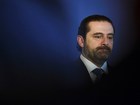The security forces reportedly postponed until Monday a plan set to reopen major roads and highways blocked by protesters “due to last minute complications,” al-Joumhouria daily reported on Monday.
 Full Story
Full Story
Unemployment and sluggish economic growth are fuelling social tension and popular protests in several Arab countries, the International Monetary Fund said Monday.
The unrest is in turn contributing to slower growth in the Middle East and North Africa (MENA) region, alongside global trade tensions, oil price volatility and a disorderly Brexit process, the IMF said in a report on the regional economic outlook.
 Full Story
Full Story
Tens of thousands of Lebanese protesters successfully formed a 170-kilometer-long human chain Sunday, stretching the length of the country from Tripoli in the north to Tyre in the south, organizers said.
"I can confirm that the human chain was a success," Julie Tegho Bou Nassif, one of the organizers, told AFP.
 Full Story
Full Story
Progressive Socialist Party leader Walid Jumblat on Sunday stressed that there can be no solution to the current standoff in the country without the formation of a “new government.”
“Away from conspiracy theories and skepticism whatever side they may come from, the core of the problem in most democracies lies in the flaw in the distribution of wealth, due to the liberal policy that shuns the progressive taxation system and tax on wealth and due to complete privatization,” Jumblat tweeted.
 Full Story
Full Story
Lebanese Forces leader Samir Geagea on Sunday hit back at “those trying to target and attack the LF,” advising them not to “waste their time.”
“Instead of wasting your time on attacking the LF, observe the unifying and comprehensive scene from Tripoli to Tyre and from Beirut to Baalbek-Hermel,” Geagea tweeted.
 Full Story
Full Story
Pope Francis urged dialogue in Lebanon Sunday after days of sweeping protests against the political class, urging the country to respect "dignity and freedom."
Tension has mounted in recent days between security forces and protesters, who are blocking roads and rallying massively in squares, bringing Lebanon to a standstill to press their demands for a complete overhaul of the political system.
 Full Story
Full Story
Efforts by Prime Minister Saad Hariri to resolve the political crisis sparked by the unprecedented popular revolt have so far been hindered by Hizbullah’s insistence on keeping Foreign Minister Jebran Bassil in the government, ministerial sources said.
“The serious attempts that PM Saad Hariri made and is still making have run into Hizbullah chief Sayyed Hassan Nasrallah’s rejection of the ouster of President Michel Aoun’s tenure, the government’s resignation or the organization of early parliamentary polls,” Asharq al-Awsat newspaper quoted prominent ministerial sources as saying in remarks published Sunday.
 Full Story
Full Story
From organizing mass protests in Baghdad and Beirut to coordinating rescue missions amid grinding conflict in Syria, WhatsApp has become an indispensable connector for millions across the Arab world.
In Lebanon, where telecommunications are highly regulated and expensive, citizens have increasingly relied on WhatsApp for free calls.
 Full Story
Full Story
In Hong Kong, it was a complicated extradition dispute involving a murder suspect. In Beirut, it was a proposed tax on the popular WhatsApp messenger service. In Chile, it was a 4-cent hike in subway fares.
Recent weeks have seen mass protests and clashes erupt in far-flung places triggered by seemingly minor actions that each came to be seen as the final straw. The demonstrations are fueled by local grievances, but reflect worldwide frustration at growing inequality, corrupt elites and broken promises.
 Full Story
Full Story
The Lebanese capital's iconic egg-shaped cinema looming large behind him, Jamil Mouawad lectured around 20 students on the politics of public space, as demonstrations swelled in the streets below.
 Full Story
Full Story



